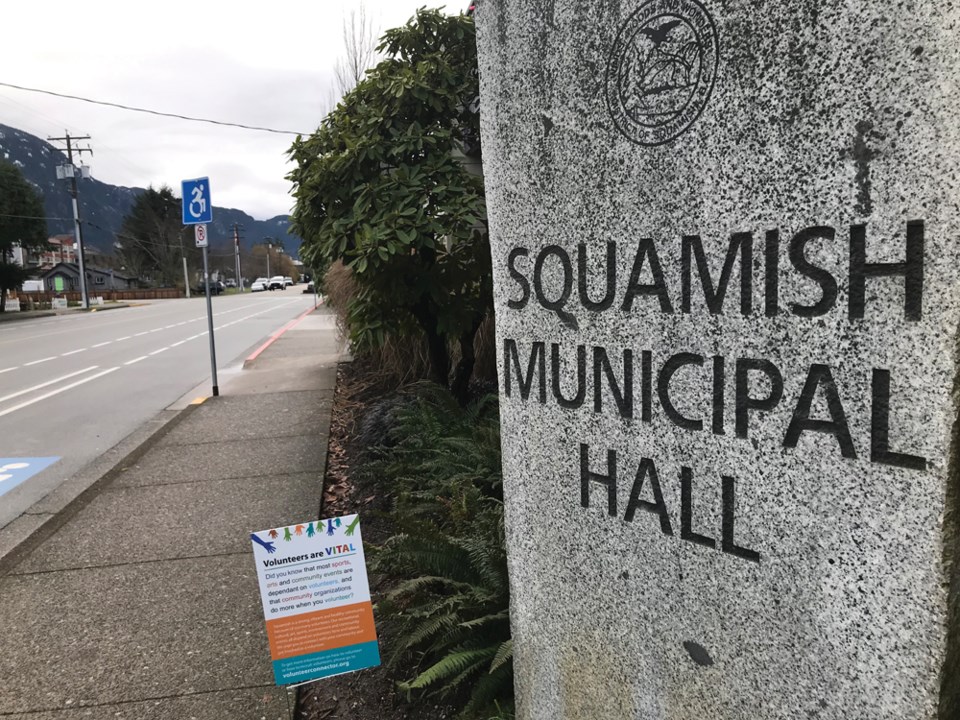Senior municipal staff will be delegated substantial new powers, which are intended to streamline council’s operations but have raised questions of transparency.
On Dec. 22, council voted unanimously in favour of two bylaws that would greatly expand municipal bureaucrats’ abilities to issue tenders, handle operating agreements and approve development permits.
“In terms of implications, I’m sure there are some out there that would see something nefarious,” said Gary Buxton, the municipality’s general manager of community planning and infrastructure.
“But, to be honest, it’s probably more vanilla ice cream than ice cream sundae. I don’t think the public is going to see a significant change...in terms of how the District operates. It will be mostly internal implication.”
Three readings were granted to both District of Squamish Officer and Delegation Bylaw No. 2794, 2020 and District of Squamish Land Development Procedures Bylaw No. 2632, 2018 Amendment Bylaw 2795, 2020.
“I’m happy to support the first three readings of this bylaw. I think it will help increase process and efficiency, and I do feel comfortable with the level of reporting that has been described by staff,” said Coun. Jenna Stoner.
Council asked that staff bring forth a reporting policy before the bylaws are adopted at a later date. This policy would be intended to allow elected officials to keep bureaucrats accountable for their decisions.
The decision comes in the context of an increasingly busy council, as meetings have been running long, and it can be a challenge to make it through a day’s business.
A rapidly growing community means that more business on development, land and facility usage has been flooding council’s agendas, creating backlogs.
Staff have advised elected officials to delegate them more power to lighten council’s load, and, generally speaking, council has accepted this suggestion.
However, during discussions on the bylaws, both council and staff noted that the public may have concerns about transparency.
The bylaws, if adopted, would give non-elected bureaucrats significantly more leeway in decisions over matters that previously required approval from council.
As part of the new bylaw, the chief administrative officer, or CAO, has “unlimited authorization” to issue tenders or request for proposal awards, so long as it doesn’t go over the limits set out in the budget.
Staff laid out several examples of such cases that required council’s approval in 2020.
This included $1.01 million to Kinetic Construction for the Valleycliffe firehall; $920,000 to Whistler Excavations for Pioneer Way upgrades; and $807,000 to Whistler Excavations for the landfill gas collection system.
Buxton said that under the new bylaw, the CAO would be allowed to authorize these tenders without having to go to council for approval.
He said the new bylaw would also give the CAO power to approve operating agreements, leases and licences that are up to $200,000 in value.
Deals regarding the leasing or operation of the forestry building, the RCMP building and Adventure Centre would be covered under this new proposed delegation bylaw.
However, there are about 99 agreements falling under this category, and most of them are already delegated out for staff approval, Buxton said.
This means that for the most part, except for the bigger items like the RCMP building, there shouldn’t be a noticeable change in how these approvals are done, he said.
Finally, under the new bylaws, staff would also have expanded authority to approve land development applications, such as development permits and temporary use permits.
As part of the proposed new range of staff’s powers, bureaucrats will be able to make approvals on temporary-use permits for swaths of land that are 300 square metres. Previously they were limited at 185 square metres.
Also included is the ability to make approvals on residential and mixed-use development permits. In these cases, staff may approve facilities where there are 20 residential units or less and where non-residential space is 300 square metres or less.
Staff may approve non-residential permits where the floor area is less than 300 square metres and can approve non-residential development permits in the business park, so long as they have no more than one accessory dwelling unit.
Any permits that have variances must still appear before council, and proponents who are unhappy with staff’s decisions can appeal to elected officials.
Buxton presented some examples of recent land development applications that would be delegated to staff rather than to council under the new bylaw.
These included a new triplex at Hope Road in Brackendale; a 13-unit townhouse development in University Heights; a 1,858-square-metre light industrial building in the business park; and another business park development consisting of two light industrial buildings.
“I’ll support this, but it is a trickier delegation, I think, than the first one, in a sense that when you’re talking about development permits, one of the aspects of it is form and character, and, inevitably, there’s some subjectivity to that,” said Coun. Doug Race.
He noted the proposed Brackendale General Store project, which, if it was delegated out for approval to staff, may have been an unsatisfactory outcome.
Race observed that when it appeared before council in November, several elected officials disagreed with the project’s form and character, and it was sent back to the drawing board.
“We didn’t like the look of it and so forth,” he said.
There will be a greater onus on staff to be in tune with what council finds to be an attractive project, Race said.
That being said, he threw his support behind the bylaw, as he argued streamlining council’s business was desirable.
The bylaws will be brought back to council for adoption at a future date.




